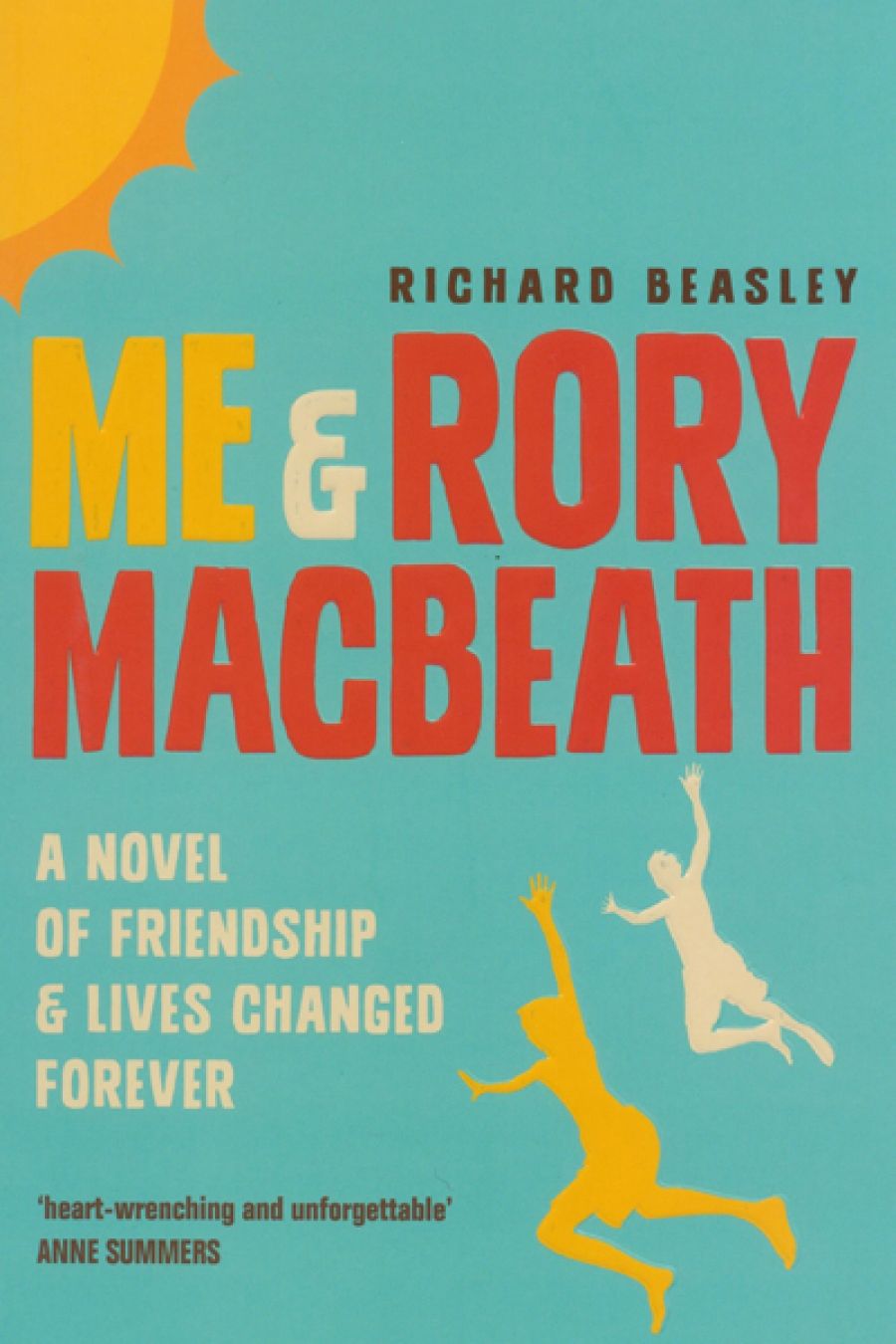
- Free Article: No
- Contents Category: Fiction
- Custom Article Title: John Bryson reviews 'Me and Rory Macbeath' by Richard Beasley
- Review Article: Yes
- Article Title: Triptych
- Online Only: No
- Custom Highlight Text:
In Richard Beasley’s third novel, a friendship between three boys ends violently, and one of them is tragically implicated. The lives of the young teenagers – Jake, Robbie, and Rory – are filled out with street football, driveway cricket, billycarts, fishing trips, slingshot target practice, and the comedy of flatulence. Their world is Rose Avenue during the Adelaide summer of 1977.
- Book 1 Title: Me and Rory Macbeath
- Book 1 Biblio: Hachette Australia, $29.99 pb, 371 pp, 9780733630309
The novel falls into three parts. The shapes and textures of the first part are those of childhood, innocence, and light-heartedness unprepared for the terrors to come. The second part is a thriller and contains the catastrophe, of which we receive this warning:
It seemed, though, that there was a whole lot of stuff that happened in Rose Avenue that you weren’t supposed to talk about. Mr and Mrs Williams yelling and fighting. Things smashing in the night. Mrs Macbeath’s bruises. Mrs Kincaid being dead but still fixing cordial or lemonade drinks. Mr Kincaid being as deaf now as Eddie, but saying he could hear Harry’s parties to all hours but him not minding because he was a night owl, and it was Mrs Kincaid, who was dead, who was the deaf one. Mr Nixon pretending Mrs Nixon had to fix up her roses and camellias and other flowers my footballs had damaged even though we hadn’t seen her in her garden all year, and she’d never minded about it before that. Eddie being not only deaf but also having too much pigment in his face, and a sister with Down syndrome who nobody mentioned and who was rarely seen. Then there were all the empty bottles Mrs Williams wrapped in newspaper and put in her bin. For a street that wasn’t much more than three hundred metres long and had only about forty houses, there were an awful lot of things that were off limits. Now there was something else that couldn’t be discussed.
Finally, the novel takes the form of a courtroom drama. The heroine is emphatically Jake’s mother, the well-drawn trial lawyer Harriet Taylor, whom Jake calls ‘Harry’. Although not mentioned in the novel, she will have seen volunteer service at a local shopfront free legal service. Harry holds firm opinions, wears her hair short, smokes when not in court, prefers a quaffing red wine, and clearly belongs to the intellectual left, which may have prompted Anne Summers’s recommendation on the cover.
A crime thriller relies on surprise for some of its momentum, so this review must take care not to work as a spoiler. The front-cover blurb writer also faced this problem. ‘A novel of friendship and lives changed forever’ is a very guarded description.
During Jake’s opening memoir in the novel, I was content to accept the emotional location of the work as a focus on friendship. By part two, and the catastrophe, this has shifted to families, and the differences in their structures. At the Williams’ neighbouring house, mother Ruth frequently storms out, fleeing the pedantry of her husband, who is damaged by high living and corporate life. At Robbie’s, family life is pleasant but careful, because Mr Duncan is a sergeant in the police force. From Rory Macbeath’s, the boys often overhear the roaring of Don Macbeath, violent and drunk. The exception is Jake’s, with no father, and little reference to whom he might have been. Jake and his trial lawyer mother live in affectionate accord, possibly because of the absence of a dominant male.
Throughout, the story is narrated by thirteen-year-old Jake, and the boy’s voice and interests spark in the reader the pleasant familiarities of an era, of place, and of the unimportance of time. The teenager’s point of view might have been problematic for adult readers, since little wisdom occupies so young a mind, but Harry carries intelligent and careful opinions, so, as Jake interprets her to the reader, she allows the work an intellectual breadth.
Part of the ambition of the novel is to treat the ways catastrophes affect personality. A crusty old neighbour confiscates all the balls that Jake accidentally kicks into his garden. After the neighbours’ own tragedy, the curmudgeon returns all the balls, under cover of night.
Some readers will anticipate the ultimate twist before Jake does, yet this is a competent novel and will be enjoyed by readers, especially those who prefer an undemanding journey. Because the story becomes a forensic drama, and because courtroom tactics are accurately treated by Richard Beasley, who is a barrister, this should also interest the younger adult reader.


Comments powered by CComment